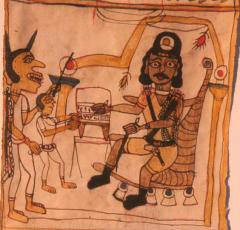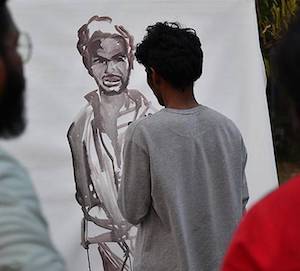
Oprom do cet’ tin…? What is my identity…?
Joidhon Soren lies, limp and listless, on a railway hospital bed. It is one of the big hospitals of the industrial town of Mahuapara, so his condition is clearly serious. He is delirious and mutters incoherently. His eyes are fixed on the ceiling with an unblinking stare and he fails to recognize anyone in the room, not even his son or the mother of his son. He mutters only one word repeatedly, “Kailash!”
Kailash is the name of Joidhon’s close friend and drinking buddy, a friend with whom he has spent many an evening at the local handi-bhati. […]
The person most affected by this turn of events is Munna, who is in his fifteenth year. These days, he has been preparing for the Matriculation Examination. He is the brightest student in his class and his teachers remark about him, “Surely, this boy will leave his mark on the world someday!” He has managed to defeat and outscore all the diku students in the school test, but today he is facing defeat in the test of life. No one guesses his inner turmoil, as he struggles to break loose from the tentacles that bind him. He is filled with uncertainty and wonders where life will lead him. […]
Translated from Santali by Ivy Imogene Hansdak
The original story in Santali “Oprom do Cet’ Tin…?” was first published in Jug Sirijol: Monthly Literary & Cultural Journal in Santali, March 2012, pp. 12-15.
Source: Oprom do cet’ tin…? What is my identity…? | Fokus INDIA
Address : https://sas1500.wordpress.com/2012/12/20/oprom-do-cet-tin-what-is-my-identity/
Date Visited: Sat Jan 12 2013 18:30:36 GMT+0100 (CET)
“The smart boy or clever girl who is deprived of the opportunity of schooling, or who goes to a school with dismal facilities (not to mention the high incidence of absentee teachers), not only loses the opportunities he or she could have had, but also adds to the massive waste of talent that is a characteristic of the life of our country.” – Nobel Awardee Amartya Sen in The Argumentative Indian (Penguin Books, 2005), p. 344 | Find this and other books published in India >>
Related: Tribal Children’s Right to Education | Childhood | Ekalavya (Eklavya, Eklabya), EMR & Factory schools | Childrens rights: UNICEF India >>

“Doctors in the region [Palakkad district] argue that while the proportion of people with mental illnesses is not unusually high, the problem is a crisis because of their socioeconomic vulnerability.” […] “The non-inclusivity of Adivasis is nothing but racial discrimination. Adivasis were always ruled.” | In-depth analysis (Scroll.in 5 April 2023) >>